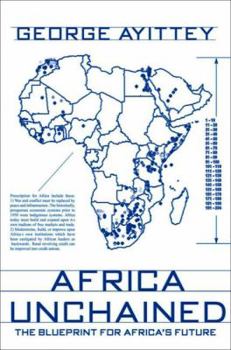Africa Unchained: The Blueprint for Africa's Future
Select Format
Select Condition 
Book Overview
In Africa Unchained, George Ayittey takes a controversial look at Africa's future and makes a number of daring suggestions. Looking at how Africa can modernize, build, and improve their indigenous... This description may be from another edition of this product.
Format:Hardcover
Language:English
ISBN:1403963592
ISBN13:9781403963598
Release Date:January 2004
Publisher:Palgrave MacMillan
Length:483 Pages
Weight:1.57 lbs.
Dimensions:1.6" x 5.8" x 8.5"
Customer Reviews
5 ratings
One of the Best that I've read on Africa
Published by Thriftbooks.com User , 16 years ago
Excellent, very well written, researched and a must for anyone who is serious about economic development in Africa
Insightful Analysis of Africa Today
Published by Thriftbooks.com User , 19 years ago
This is the most brilliant text on Africa I have read, and I don't say that lightly. With almost 500 pages of small text, it's not exactly a breeze to get through, but it is worth every second spent. The author unapologetically describes the mess that the "Hippo" generation following decolonization made, and how it ruined the continent. His prescriptions, which amount to `Africans must solve their own problems in their own way, growing out of African traditions', is right on. I hope that anyone interested in Africa reads this book.
Tough Love for Tough Challenges
Published by Thriftbooks.com User , 19 years ago
For too long written off as irrelevant to international affairs except as the stage for proxy conflicts during the Cold War or the recipient for the world's charity, Africa is nonetheless poised to play an increasingly important role in the global community of the 21st century. Within the decade, West Africa alone will provide more than one-fourth of North America's petroleum imports, surpassing the entire Middle East. The continent also boasts the world's fastest population growth: by 2020, there will be an estimated 1.2 billion Africans-more than the combined populations of Europe and North America. Yet despite the dynamic potential implicit in these natural and human resources data, Africa remains the world's economic basket case: per capita GDP is barely $575 while thirty-two of the thirty-six countries classified by the United Nations Development Program are to be found in Africa. Why this apparent contradiction? Defying the conventional wisdom that has long infantilized Africans by blaming colonial exploitation, superpower rivalries, intergovernmental aid agencies, impersonal market forces-anyone and everyone external to the continent-Dr. George B.N. Ayittey, himself a son of Africa, points his finger at the causes closer to home: the "vampire states" and "coconut republics" whose undemocratic and illegitimate rulers have done more harm to their own people than any external agents. In short, Africa Unchained is an unusually frank truth speaking to power-or rather, a dose of tough love for the tough challenges faced by the nations and peoples of the continent. Unlike many works on Africa, however, Dr. Ayittey's does not end on a pessimistic note. Rather, he points the way forward by looking back at the continent's own rich history of freedom: free enterprise, free markets, and free trade, by free people organized in free societies. The road ahead, he correctly points out, lies through the past-recovering the authentic, acknowledging the baleful. A provocative thesis, to be sure; but it is one which deserves to be considered by scholars and policymakers. -Dr. J. Peter Pham, author of Liberia: Portrait of a Failed State
Recommended
Published by Thriftbooks.com User , 19 years ago
I enjoyed this book. I have read many novels by Africans and also books on African political history-Mr. Ayittey's Africa Unchained gave me an even deeper understanding. I had not been particularly interested in economics, but Mr. Ayittey has opened my mind. I think the editors could have been a bit more diligent, but all in all I would recommend this book to anyone who has an interest in Africa.
Ayittey takes a new fresh look at Africa's future
Published by Thriftbooks.com User , 19 years ago
In Africa Unchained (January 2005), Ayittey takes a new fresh look at Africa's future and makes a number of daring suggestions. First, he says economic development requires investment, both foreign and domestic. Investment, however, does not take place in a swamp or vacuum but in an "enabling environment," which must have, among others, the following features: security of persons and property; rule of law; and basic functioning infrastructure. This environment does not exist in many parts of Africa because of the absence of a few key critical institutions: an independent media, an independent central bank, and an independent judiciary. These institutions are established by civil society or parliament, not by corrupt leaders since they are fundamentally opposed to the establishment of institutions that will check their arbitrary use of power. Second, looking at how Africa can modernize, build, and improve their indigenous institutions, which have been castigated by African leaders as "backward and primitive," Ayittey argues that Africa should build and expand upon these traditions of free markets and free trade. Asking why the poorest Africans haven't been able to prosper in the 21st century, Ayittey makes the answer obvious: their economic freedom was snatched from them. War and conflict replaced peace and the infrastructure crumbled. In a book that will be pondered over and argued about as much as his previous volumes, Ayittey looks at the possibilities for indigenous structures to revive a troubled continent. Reviewed by David S. Fick, Author of Africa: Continent of Economic Opportunities, STE Publishers, Johannesburg SA, May 2005, www.ste.co.za





